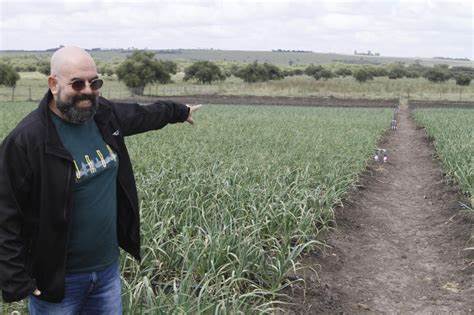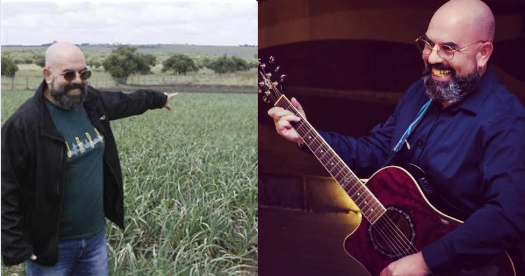‘Unajua, Ati babe it’s cold outside, Mpenzi won’t you come inside? You don’t have to hide your love’
It is a famous song; one that the average Kenyan mimes along when it comes up on radio. The artiste behind it is Gilad. Or, in more official terms, Gilad Milo.

The hit song was released in 2015. It has been six years since. In that period Gilad’s work revolved around developing music, winning awards, being a creative, releasing hits and establishing his ‘Balozi wa mapenzi’ persona.
What many of his fans don’t know is that before music Gilad was essentially a farmer. He has worked in farming spaces, first with Israeli aid agency Mashav, and later with Amiran – where he was the head of public relations.
Generally, though, Gilad believes that human beings are not placed on earth just to be one thing.
Want to start a garlic farm? Master the basic skills first I would sharpen knives for Sh10 before this garlic empire bloomed Want to start a garlic farm? Master the basic skills first I would sharpen knives for Sh10 before this garlic empire bloomed
“You cannot just be a journalist. Life is too interesting for that. I have been a journalist, a diplomat, a musician, now a farmer, and I am just getting to 50,” he says.

Israel is famous for its farming technologies: evidenced by the fact that the country produces enough food to feed its population and surplus for export. Yet, the country is mostly desert land.
It seems, the average Israeli is a good farmer. Gilad is not an exception. For the past one and a half years, Gilad has been farming garlic.
He says: “It has been many years since I started thinking about doing this. Last year, just before Covid became a thing in Kenya, someone came up to me and suggested that we do it.
“I said, ‘Why not?’. It was somewhat perfect timing because while the country was under lockdown and there weren’t many shows to perform in I would be here at the farm to work the land.
“We grow garlic, we buy garlic from farmers, we germinate quality cloves (seeds) for farmers, and work with farmers to produce even more garlic.”
Gilad’s farm – which he co owns in a tripartite partnership – is located off Kiserian road in Isinya, Kajiado County. They have named it Ole Raha farm: a play on the initials of the three partners.
He braves at least an hour-long drive one way, every day. Such is the dedication that commercial farming requires.
He does not hide the fact that he has always been baffled by Kenyans taking off to the city to make money only to end up employed in low paying jobs.
“When you talk to this person you learn that they have fertile idle land back in the village – which they could use to farm and make lots of money compared to what they make in the city,” he says.
He suspects it has something to do with the bad rapport farming has received from many quarters over the years. The image that farming portrays, he suspects, is one of poverty. Yet, the contrary is true.
From his days at Amiran, Gilad has been an advocate for farming. “My ambition is to empower and assist people believe in agriculture,” he says.
According to him, agribusiness is the most available means of wealth creation in Africa.
If you wanted to go into farming, say growing garlic, what should you know?
Here is Gilad’s wisdom.
Gilad was essentially a farmer. He has worked in farming spaces, first with Israeli aid agency Mashav, and later with Amiran [Jennifer Wachie, Standard]
Nothing good comes free. And farming, like any other business, needs investment.
“The investment depends on factors such as location. For us we had to bring a tractor for mowing because it was virgin land. We mowed twice. We then we mixed the soil with manure.
“We created beds, hoisted the water tank, installed the drip irrigation system, and brought in labour. We also fenced the field,” he says.
These were one-off investments – to set up the farm; which Gilad says cost him and his partners a few millions. There are however operational costs – recurrent expenditure.
Garlic is part of the onion family. But compared to onions, garlic needs substantially higher investments. Perhaps, Gilad notes, it is part of the reason Kenya has few garlic farmers.
“We have chosen tighter spacing – it has worked better for us. We grow 350 – 400 Kg of cloves per acre. Set aside about Sh200, 000 for buying cloves alone.
“Add approximately Sh100, 000 for labour, pesticides, fertilisers and miscellaneous. In total, you need about Sh300, 000. And then of course you need to invest your time as well,” he says.
“You cannot do farming without water. Period. End of the story,” Gilad says, matter-of-factly. Many times people come to him to ask what they could do with some piece of land.
“My first question to them is usually, ‘Do you have water?’. If you do not have enough water do not even start.”
Garlic is a four-month season crop. But in the first two months, he says, the crop requires a lot of water. “You forget to water for half a day you could damage your crop,” he says.
Water was the main factor in choosing the location of the farm.
“We had visited plots in Athi River and Rongai but none had the kind of vibe we got here. Here, there was a functioning borehole ready for use,” he says.
The farm uses a drip irrigation system. However, in water abundant areas, one can even construct furrows or irrigate using a hose.
Start small, experiment, then go big if you like it
Farming, Gilad notes, requires passionate commitment. In other words, you cannot plant, go away and show up four months later to harvest. You have to put in your time and energy.
What would motivate you to wake up every day, head up to the farm, and get your hands dirty if not passion?
Often, he says, people approach him, “with many acres of land” to venture into garlic farming.
“I tell them not to start big. I tell them to start on one acre or less. Learn and become knowledgeable in what exactly it entails. Experience is the best teacher. Learn about curing the harvest, the marketing, the work input, if you like it then go big.”
One of Gilad’s partners at the farm is an agronomist and a garlic specialist. Even they joined the venture with the view to learn and improve with time.
“Right now we are achieving 100 per cent maturity – which is very rare. But in the previous seasons we had gaps. We have perfected what we do over time and with more experience we get even better doing it,” he says.
‘What can I grow?’ is a question that many aspiring commercial farmers ask themselves. Gilad [and his partners] too pondered on it.
They chose garlic farming because “It is an underutilised sector,” he says. The market needs for garlic in the country is not even being met by current production, he says.
In any business, he adds, it is good to not got where everybody is going. The garlic sector is underpopulated compared to other vegetables such as tomatoes and onions.
How do you make a profit?
In the end, it all boils down to making a profit. Gilad’s quick math suggests approximately 100 per cent returns if the farmer adheres to all garlic growing protocols.
“Assuming the farm is already established, you would spend, on average, about Sh300, 000. In the last season we produced 5 tonnes per acre. But to be conservative, let’s say you will produce 4 tonnes.
“The price of garlic ranges between Sh150 to Sh300 per kilogram. Assuming you sell at Sh150, you end up with Sh600, 000 per acre. In other words, you have doubled your money,” he says.
“It is an option for farmers buying seeds from us. We offer them free counsel and when they harvest we buy back the produce at Sh150 per kilogram,” Gilad says.










































